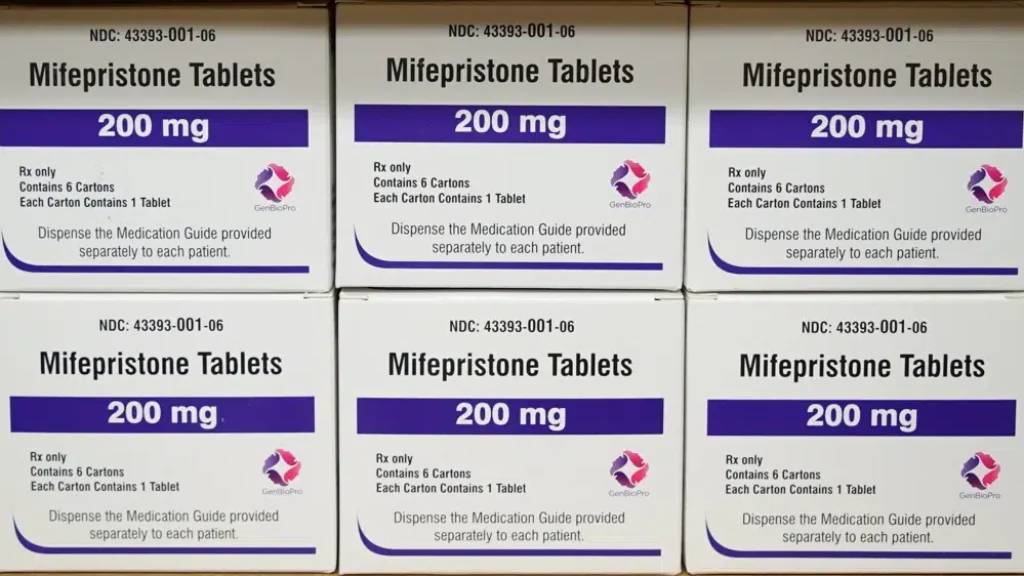WASHINGTON — The U.S. Supreme Court on Friday ruled 7-2 that a commonly used abortion pill could stay on the market pending further legal review, in the process preserving the Food and Drug Administration’s authority to approve and regulate drugs.
The decision, a victory for the Biden administration, puts on hold a Texas district court decision earlier this month that would have forced the drug off the market this week. The case will now head to an appeals court, which will weigh in on whether the pill can remain on the market in the next 26 days.
Dozens of pharmaceutical companies, public policy experts, and industry lobbies also joined the administration in railing against the mifepristone decision. They argued the move would ripple across the drug development space, endangering any approved product that activists find controversial or political, from vaccines to birth control and hormone replacement therapy.
The Supreme Court’s Friday decision does not end legal threats to the pill but punts the case back to an appeals court, where it is likely that mail-order access to mifepristone will be the central focus.
Justice Samuel Alito, in a dissenting opinion, argued that a stay last week by the Ninth Circuit Court of Appeals — which he delayed pending Supreme Court review — would not have taken mifepristone off the market but would “simply restore the circumstances that existed (and that the Government defended) from 2000 to 2016 under three Presidential administrations.”
The Biden administration in December 2021 removed a requirement that doctors dispense the drug in-person and earlier this year announced that pharmacists could register to provide mifepristone, though few pharmacy chains have taken up that option amid legal uncertainty.
While the FDA’s approval of mifepristone stands, the remaining possibility that a court could interfere in how it can be prescribed still leaves the door open to similar challenges for other drugs. Birth control, for instance, is commonly prescribed through telehealth providers and sent through the mail.
White House officials, pharmaceutical companies, and legal experts have argued that court intervention in the FDA’s regulatory process could upend the agency’s authority and throw drugmakers into uncertainty and hesitation to develop potentially controversial products.
Friday’s decision is also unlikely to assuage pharmacists who have considered supplying the medicine. Walgreens already said after pressure from Republican attorneys general that it would not provide mifepristone in abortion-restrictive states, earning the ire of California’s Democratic Gov. Gavin Newsom, who said the state would end business with the major pharmacy chain.
Texas Attorney General Todd Rokita sent a letter applying similar pressure to at least one other major pharmacy benefit and telehealth provider, Carelon, last month, writing that federal law prohibits transporting drugs intended for abortion through the mail.
The FDA first approved mifepristone more than 20 years ago for abortions and miscarriages in the first 10 weeks of pregnancy, when the vast majority of abortions occur. Federal data show the drug has been associated with nine deaths over those decades, far fewer than other commonly used medicines, such as over-the-counter pain drugs. However, Northern Texas District Court Judge Matthew Kacsmyrck argued in his ruling earlier this month that the FDA did not consider all the safety data and acted politically when approving mifepristone.
With the legal battle looming, several liberal states including Massachusetts, California, and Washington began stockpiling mifepristone, and another drug used to induce abortion, misoprostol. Legal experts also suggested the FDA could essentially refuse to penalize doctors who prescribe the drug through an agency authority known as enforcement discretion. However an anti-abortion White House would easily have been able to end that discretion and go after mifepristone providers or scale up oversight of mail-order drug deliveries.
The Friday Supreme Court decision “offers a temporary sigh of relief,” Sen. Patty Murray (D-Wash.), chair of the HELP committee, said in a statement. “But this fight is not nearly over — and let’s just be clear: it is absolutely outrageous this case ever made it this far.”
Other court cases surrounding the drug continue. In Washington state, a judge is considering a case arguing that the FDA has applied too many safety restrictions to mifepristone. Meanwhile in Maryland, GenBioPro, maker of the generic version of mifepristone, sued the FDA to ensure the drug remains on the market regardless of court decisions.


